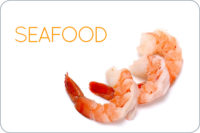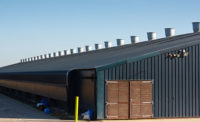Battle Plan
Cargill Meat Solutions’ turkey business is competing for marketshare by recruiting new consumers with sumptuously novel fare
John O’Carroll is a man with a mission, a team of veterans to back him up, and a parent company with the necessary resources. As president of Cargill Value Added Meats, a business unit of Cargill Meat Solutions (CMS) in Wichita, KS, O’Carroll is leading the charge to grow the per-capita consumption of turkey with value-added products.
“Turkey is the perfect protein because it can deliver great taste and strong health benefits, but household penetration is underdeveloped,” O’Carroll says. “It is a great value and can offer a delicious eating experience. There are many frequent turkey users, but others have never tried the product for everyday use. That is what we are about, getting more people to try turkey.”
One of the 13 business units within the Minneapolis-based Cargill Incorporated family of companies, the CMS portfolio of turkey, beef, and pork operations collectively generate annual sales in excess of $15 billion. Creating demand on the turkey side of the business has taken O’Carroll’s team to new product development frontiers and on the hunt for innovative market penetration tools. The CMS turkey business — ranked as the second largest U.S. operation behind Hormel Foods’ Jennie-O Turkey Store subsidiary — produces a variety of branded and private-label products. The unit annually develops products from about 1 billion pounds of raw material. Honeysuckle White and Shady Brook Farms comprise the unit’s primary brands.
“All of the companies in the turkey industry are challenged to find ways to introduce more people to the features and benefits of turkey,” O’Carroll says. “Although total consumption is about the same as in recent years, more and more of that is being consumed in value added, further processed products.”
Acknowledging that ground turkey has been available for more than a decade, O’Carroll emphasizes that per-capita consumption has increased dramatically only in the past three years.
“We measure per-capita consumption every year as an industry,” O’Carroll reports. “In our business, pretty much everything we produce gets consumed one way or the other. It’s the price that changes. We know how fast some of these categories are growing. We also know that some of the categories have a very low penetration, meaning that there are consumers who have not even tried the product yet. If they tried it, there might be a significant increase in consumption.”
Household penetration on ground turkey is 20 percent, O’Carroll reports, which is low considering how many ways the product might be used.
“What we as an industry have struggled with over the years is how to sell all of the parts together, particularly non-holiday products,” O’Carroll says. “We try to develop products that not only address consumer needs, but also utilize parts of the turkey that the consumer may not have been used to. Examples of this might be thigh meat fajitas, turkey cutlets, or ground thigh meat for chili. Consumers know what to do with the breast. They cook it and eat it sliced, or else cook it for a roast. Finding a good value for the other parts of the turkey has been a real challenge for us.”
To be sure, value-added products offer strong growth opportunities, which is reason enough for the CMS turkey group to continue the push to bombard the marketplace with new and creative turkey products. The recent teriyaki flavor addition to its Honeysuckle White and Shady Brook Farms lines of marinated turkey tenderloins represents a buttress to the company’s product-development approach. Established flavors in this same line include rotisserie, created by rubbing breast meat with a savory blend of onion, peppers, and cilantro. The home-style version is a traditional oven-roasted flavor, and lemon garlic adaptation blends tangy lemon with robust garlic. The products come in upgraded packaging containing two marinated tenderloins of approximately 1.85 pounds. The vacuum package features a full panel photograph showcasing the product and a clear panel on the other side.
Although he expects the Thanksgiving turkey tradition to endure, David Barocco, Cargill Value Added Meats’ vice president of retail and deli sales and a 24-year turkey industry veteran, says that alone will not do enough to fuel everyday per-capita consumption growth.
“Our growth will come from further-processed products that are easy, quick, and tasty,” he confirms. “New products are our lifeblood. Routinely our retail customers are looking for new products that help them grow the turkey category. We are constantly identifying ways to interest their consumers in turkey for everyday use. Typically this involves both product innovation and strong consumer marketing support to drive both trial and repeat purchase.”
When a retail customer in the Southwest mentioned a desire for a regional turkey product, Cargill Value Added Meat’s R&D team delivered a thin-sliced turkey Milanesa.
“They were looking for a certain type of turkey product that would grow regional business,” Barocco reports. “However, the name Milanesa is not as meaningful in the Northeast. People in that part of the country are more familiar with scaloppini, something they are used to from Italian restaurants. We market the product to take advantage of regional differences.”
Cargill Value Added Meats develops products for retail, deli, and foodservice channels. Retail products include whole birds, bone-in breasts, a full line of case-ready, tray packed turkey wings, drumsticks, ground turkey, sausages, and vacuum-packed marinated items. Numerous varieties of fully cooked turkey, beef, and ham are sold to delis throughout the United States. A Tender and Tasty turkey burger was recently introduced for foodservice.
“Every retailer is trying to find ways to compete in a constantly changing environment,” Barocco notes. “In every case that involves creating a strong identity with consumers to draw more of them into the retailers’ stores. They are constantly looking for ways to create value in the most efficient way possible. Cargill Value Added Meats is dedicated to creating long-term partnerships with retailers to create distinctive value that grows their business.”
The CMS turkey group is looking to cooked turkey products for future business growth. “We know our marketshare in cooked products is relatively small, but it is growing,” O’Carroll says. “Cooked products offer both consumers and customers significant convenience.”
Turkey marketing strategies have changed considerably over the years, notes Barocco, recalling that further-processed turkey meant a school lunch roast when he first joined the industry.
“I have watched the value-added turkey business really grow from its beginning,” he says. “Turkey products have progressed dramatically from the days when turkey was primarily seasonal. As an industry, our number-one priority should be to get consumers to pick up turkey for the first time. Once they try it, they will stay with us. From a sales perspective, we have to be innovative in everything we do. Distinctive value means an idea or product that will create consumer advantage in the marketplace.”
Turkey will become a daily center-of-the plate option right along with red meat cuts in one form or another, if CMS turkey team members have their way.
I have never felt more positive about the turkey industry than I do now,” Barocco concludes. “The growth we have experienced in our further-processed business has been double digits for years now. Yes, we have many challenges ahead, but consumer use of value-added turkey products is expanding. If we do the job right, turkey can provide the perfect combination of great taste and health benefits. As more and more of these products reach the consumer, I think this business will grow exponentially.” NP




